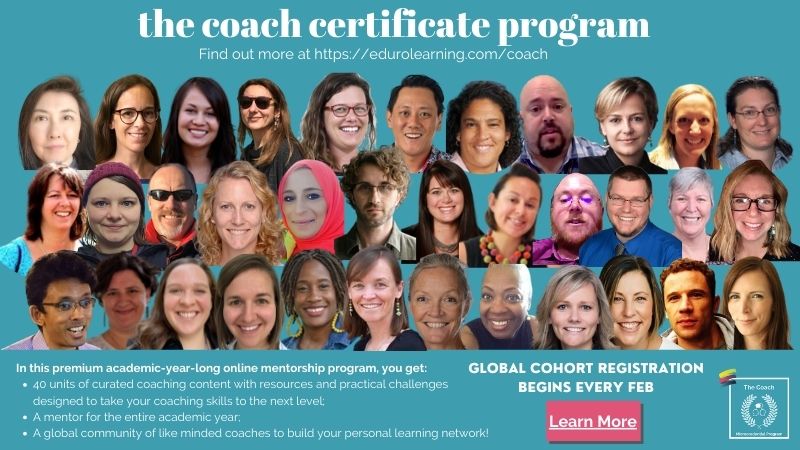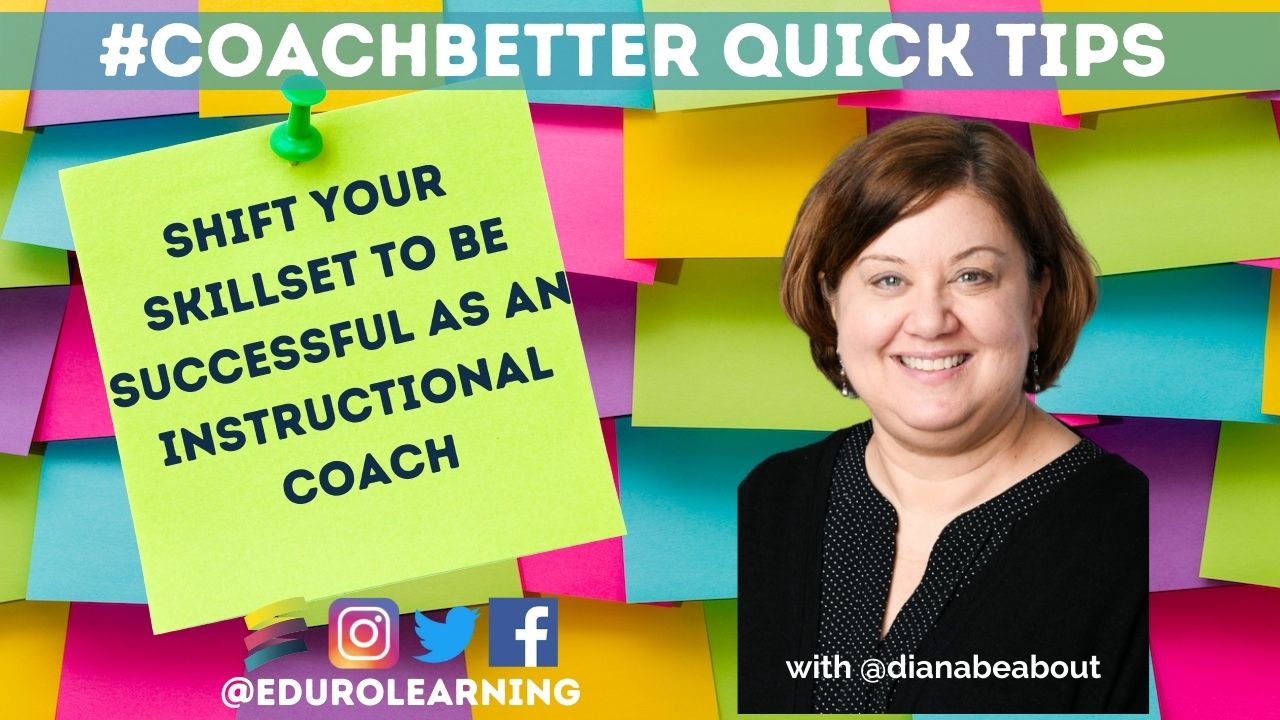When I made the shift from classroom teacher to coach there were skills that I needed as a coach that went beyond the skills I was bringing from the classroom. There are skills and strategies that are not always addressed directly as educators transition into a broader coaching role where we tend to focus on working with individual teachers and apply skills related to coaching conversations and observations.
Today, I’m going to share three questions to consider regarding your coaching skill set when making the shift from a classroom teacher to an instructional coach.
The many roles, skills, and strategies of an instructional coach is one of the topics we address inside The Coach Certificate and Mentorship Program. This academic, year-long online certificate & mentorship program will empower you to confidently apply instructional coaching strategies in any situation – from having coaching conversations, to building a coaching program, to being a leader in your school community.
Registration for our annual global cohort opens only once a year and is now open!
This post will give you a peek into the kinds of conversations you can experience and if The Coach is right for you! Head over to edurolearning.com/coach to find out more.
3 Questions to Ask Yourself to Shift Yourskillset
Now, let’s take a look at how you need to Shift Your Skillset to Be Successful as an Instructional Coach. If you’re a coach, you’re already enthusiastic, passionate, and engaged in working with students and teachers, and perhaps an advocate for a specific subject area. However, the skills that got you to a coaching position are most likely not the only set of skills you need to be successful in this position. As you shift into this role, you need to build a new set of skills. Here are three questions to consider as you continue to build your skills and strategies for a coaching role.
1: How confident are you in understanding the systems view of your school?
We often refer to this as the “big picture”. As a coach you need to have an understanding of the school goals and the community needs. You’ll need to shift from a micro lens to a macro view of your school. What skills will you need for working with individual teachers and teams in a broader context? How will your role as a coach work within the whole school community? How might you need to shift or build your skills in communication, systems thinking, organization, project planning, time management, and self reliance?
This was a big shift for me as I moved into the role of the coach. At first it was a big learning curve to understanding all the different moving parts of a school organization but the more I understood the better I was able to support teachers, students, administration, and the parent community.
2: How will you manage your interactions with the whole school community?
In the teacher to coach transition, you will be working with a broader range of individuals, teams, and groups than previously. Many coaches were recognized as leaders in their classrooms and teams as classroom teachers which made them great candidates for coaching roles. However, there is a need to move beyond those familiar spaces. As a coach, what skills and strategies need to be expanded and adapted when working with a variety of people in a variety of contexts? What role will compassion, emotional intelligence, observational skills (aka ‘reading the room’), communication, and adult learning principles play in how you adapt to your role as a coach?
As a coach, I realized I had to be very adaptable and open in my role as I worked with and supported individuals, teams, and groups with a variety of goals and perspectives. I had to ground myself in the role of the coach – to facilitate thinking and support the goals of those I worked with – from an individual teacher to grade-level or content area teams to the parent community.
3: How will you manage the change in perceptions of you as a teacher who has moved into a coaching role?
Many coaches I’ve talked with shared their concerns of how their colleagues would react to their transition from classroom teacher to coach. This is not just a shift for you, but also for your colleagues. You have a new role with new responsibilities that go beyond just being a peer. Unfortunately, depending on the culture of the school, some teachers might see you more like an administrator. There may be questions about you not having classroom responsiblities or how a coach would benefit them and their students. How will skills around communication, leadership, resilience, and vulnerability be important in understanding and addressing any issues with perceptions?
I made the shift from classroom teacher to coach within the same school so I had to work with my colleagues to understand the process I was going through as I moved from the classroom to a broader role as a coach. And it was an on-going process in communicating my role and the benefits of working together in this capacity.
Moving from the classroom into a coaching role is very exciting and full of opportunities. There are obvious skills and strategies that coaches need to continually build and apply such as building relationships, active listening, coaching conversations, student-centered learning, data informed decisions, etc.
However, there are broader views that especially new coaches need to be aware of and act upon that aren’t always addressed in professional learning for coaches. Being aware of the skills and strategies needed to work within a school or organizational systems, to interact within the whole school community, and to address perceptions of the coaching role are also necessary to Shift Your Skill Set to Be Successful as an Instructional Coach. Understanding these aspects that instructional coaches need to address will lead to more effective and positive coaching experiences and benefit the school community.
Watch the Video
Prepare for Your Role as a Coach!
Curious to dig deeper into the shift from classroom teacher to instructional coach and how you can make a bigger impact in your school community?
Please join us for our next cohort of The Coach Certificate and Mentorship Program! Wherever you are in building a coaching culture in your school, The Coach will give you the strategies, skills and tools you need to make coaching a success and will empower you to confidently apply instructional coaching strategies in any situation – from building a coaching program, to having coaching conversations, to being a leader in your school community.
We facilitate only one cohort each academic year so we can offer individualized support for each participant.
Registration for our next global cohort closes on the 14th of March.

Find out more at: https://edurolearning.com/coach/

Recent Comments